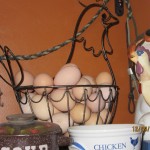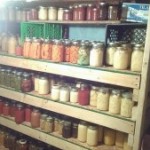I’m on Facebook quite a bit. And I am a part of many groups that span interests including cooking, farming, homesteading, homemaking, Christian living and more. And one common question that pops up everywhere involves grocery budget and cutting costs. I notice that families half the size of mine are spending twice as much as we do or more each month. I know location, ability to cook (basic cooking skills), time available to cook, preferences and availability of certain foods play a huge part in what one shops for and pays for groceries. Further details sometimes reveal that they rely on freezer meals for those busy weeknights, quick breakfast cereal or pastries for the early and quick breakfasts before shuttling everyone off to school, lunches are purchased away from home, and on the weekends everyone is so tired that they order food or eat out. Hardly any food is cooked from scratch. There is so much one could do to reduce the grocery bill with shopping tendencies like this, without adding a tremendous amount of effort or time needed (that’s perhaps the best part, right?). If this sounds familiar, there is plenty of hope to reduce your budget. As far as cooking ability goes, anyone can learn to cook. I love helping others discover joy in cooking (That’s one reason I have this blog!). Food availability plays a part in grocery prices. Some people have good luck ordering their groceries online when they don’t have a local selection of stores. Farmers markets, when in season, can be a great place to find cheap and nutritious food. Sometimes a longer drive less frequently can be a solution if you can budget for once or twice a month shopping to a grocery store with good prices. Maybe you can barter services for food from a local farmer.
I understand lack of time, trust me. I have to juggle homemade meals between my husbands midnight work schedule (so I often cook a dinner type meal in the morning for him when he gets home, in addition to our normal breakfast food for the rest of us. We later reheat the dinner I made for lunch), homeschooling six kids, running a small farm, and normal housework. Granted, I am home through the day, but I don’t have time to be in the kitchen for long. Our grocery budget, depending on the month, fluctuates between $200-$400 for our basic month-to-month items for a family of 8. We prefer to stock up on items each month, focusing on different items as the budget allows and as better deals are available for in-season items, so some months we spend more. And it fluctuates for many reasons – a lot of it has to do with how much we have to spend, how our supply of food is, and how much our farm or hunting season has provided. We have moved from an urban farm to 15 acres last July, so I have yet to put a big garden in and really spread our wings. We tried to eat as much food we had stored as we could before our move so we didn’t have to move so much and I didn’t put in a big garden because of our move at our old house (so our stock is quite low and we are in the process of rebuilding). I am hoping to drop our monthly budget even more once we get the garden producing and gradually begin producing more and more non-garden items ourselves. We look forward to hunting our property in the years to come after a successful first season here.
Some months we have a lot of rabbits to butcher, some months we don’t. The months we do, we eat a lot of rabbit. This past month we were blessed with a deer from a car accident. So, we are eating a lot of venison and my red meat need for the month has dropped. We also have some rabbits and a couple chickens to butcher, so our white meat needs are also reduced. We don’t eat breakfast cereal or breakfast pastries (but we do eat breakfast! Here are some non-cereal ideas we use). We rarely buy milk and we don’t buy juice (the lack of nutrients from those items are easily made up elsewhere). We don’t buy snack food, or frozen meals, or seasoning packets. We also don’t buy cookies, donuts or sweet treats as a general rule. We do eat a lot of meat, vegetables, fruits, in their basic form. Basic ingredients can be transformed into great meals. I don’t buy steaks or pricey cuts, and unfortunately can’t afford organic (though our chickens are free range and once we start butchering them and get into gear with that in the spring I will feel so much better about our meat choices). When I garden, I use sustainable, chemical free practices. Knowing fresh, nutritious food is soon to be had from home makes me feel a little less guilty about not being able to afford to eat organic everything.
Our grocery bill this past month looked like this: chicken, maple syrup, honey, frozen vegetables, frozen fruit, tomato sauce, tomato paste, pasta (I am planning another night to make a big batch of pasta, but until then I figure pasta is cheap enough to make it worth our while to purchase just until I can make more), cream cheese, butter, sour cream, oatmeal, peanut butter, fresh veggies, garlic, cocoa, cinnamon, bananas, oranges, lettuce mix for salads. This was for our month-to-month needs. We purchased additional stock-up items too, but could have done without them if need be. I will combine this with what we already have at home to make 3 from scratch meals every day, plus snacks as needed. A lot of that will be eliminated once we establish our gardens and expand our rabbitry and expand into raising meat birds this spring. Eventually we would like to get a beehive, and goats for milk/meat, and for all I know we might have sugar maples on our property that we could learn how to tap and make maple syrup from. Snacks include popcorn made on the stove, baked tortillas and a dip or hummus, smoothies made with frozen fruit, greens, nuts and flaxmeal or chia seeds, raw veggies and dip, and more.
- Pastured rabbit
- Chickens near the kids play area in the fall
- Salad from the garden
- Potatoes in jars
- A view of some of my canning shelves
There are things we no longer find ourselves buying – those are things easily enough made at home or raised at home. When we butcher rabbits, I make stock from their bones. It tastes so similar to chicken stock that I use it interchangeably in recipes. I can it and stick it on the shelves, and this easily lasts us from one butcher day to the next. Breadcrumbs, baked beans, soups, cream-of soups, spaghetti sauce, pizza sauce, canned beans, refried beans, minced onion and onion powder, seasoning envelopes, gravy, doughs and crusts, most condiments… These are all made at home. Most of these are made in bulk and stored in jars. Some are canned in bulk and stored on the shelf. Some are mixes that liquids are added to. We have canned vegetables on the shelf so we don’t buy many of those vegetables in tin cans. I also have dehydrated food in various forms that we use in many different ways.
One year we were able to grow all the tomatoes we needed so we never had to buy tomato sauce, paste, diced tomatoes or any tomato product. That sure was nice. I hope to accomplish that again this coming year because we eat a lot of tomato sauce. I don’t buy processed food for the family, however my husband likes to keep some frozen meals in the freezer. He buys them at discount stores and they come in one person quantities. He uses those for days that he goes into work early and I don’t have a meal prepared yet, or when he’s hungry between meals. Considering their cost and how much money we save in general, him having meals like that doesn’t break the bank. I also keep homemade meals in the fridge such as pierogi, golabki, pot pies, and much more. Just depends on what he is in the mood for.
When summer and fall hit, and fresh produce is on the cheap, I typically buy a lot of potatoes, sweet potatoes, corn, tomatoes, carrots, green beans, etc. and can them. This year I hope to avoid purchasing any vegetables in bulk because I will be growing a couple acres of food. Over the winter I can soups and dried beans. As opportunity presents its self, I find myself canning meat as we butcher or find it on sale. I make a lot of frozen meals we would otherwise buy if we had the money. We don’t eat out, as a general rule. Occasionally we find ourselves on the road longer than anticipated where getting home in a timely manner is not possible to feed the kids. We usually grab pizza or something cheap (Mexican comes to mind, if we are near a Mexican restaurant. A family order x2 of fajitas is filling, healthy and cheap). We do try to avoid fast food restaurants as much as possible.
Having said all of that, it’s all a general rule. But sometimes, rules are broken. It may seem like a lot of work, but it has become part of our lifestyle. My husband goes to work to earn a paycheck. While I may not be out earning a paycheck outside the home, I feel that some of the things I do to save the money that does come in earns me some bonus points and it’s not all done for nothing. I consider myself to be working just as hard as he is, but within the home. This lifestyle certainly saves money, but it’s not without some effort. Some nights I find myself up late refilling seasoning mix jars for things like spaghetti sauce, taco seasoning, pizza sauce seasoning, etc. Or making tortillas, pasta, peirogi, meatballs, or whatever else we tend to make in bulk. But then I have enough of that item, generally, to get us through a few months to a year with proper storage. It is enjoyable to me. We still eat very good, even if we don’t buy sweets, we do make them! We may not eat out, but I make a lot of recipes that are similar to foods we might buy if we did eat out. I have learned many ways to cut time in the kitchen – and I will share those ideas as I remember them. This didn’t all come about overnight. It was a process that began only 11 years ago. You switch out one item on your shopping list for one that is homemade and go from there. Want to buy something that looks good? We figure out if we can make it at home first. Some things are too time consuming to make. I learn where to draw the line. We buy some things that aren’t worth my time to make, or we do without. When we have busy days planned, we like to use the crockpot to provide a warm meal as soon as we need it. It even beats freezer meals!
For us, cooking from scratch is not solely to save money though, as some homemade items cost more to make from scratch than to just buy already made (not many though). But I like to know what is in our food. I like being able to swap certain ingredients for healthier alternatives, lower salt content, substitute honey for sugar, and know exactly what my family is eating. There are so many fake foods out there that don’t nourish our body. It’s getting harder and harder to find real food in the grocery store, so I make up for that at home the best I can.
- Mom and son
- Beet stained hands
- Harvest!
My kids are old enough to start helping with meals. My oldest just loves to prepare meals, or help with sides. They all enjoy gardening along side me and prefer the taste of homegrown food, too. All of our kids are brought up in this lifestyle and all help out as their maturity level allows. They help feed the animals that give their lives to nourish ours. They are taught respect and honor. They are taught not to waste and make do with what we have. We want to be good stewards of all God gives us. They are learning to hunt and gather, try new foods and be thankful.
I will write more blog posts soon on keeping the grocery budget manageable – the nuts and bolts of how we make our food stretch and how we make basic ingredients come to life. I will also write about living in the city and how we managed to keep our grocery budget under control then. If you have any questions in the meantime I would love to talk about scratch cooking with you and help you personally based on your circumstances. If you are local, I would love to introduce you to canning, sausage making, gardening or any number of kitchen skills and techniques you would like to learn more about.












